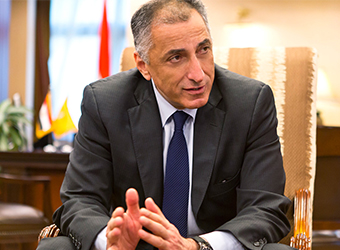Egypt’s transition from a struggling economy to one of Africa’s revival stories throughout 12 straight months is adding to evidence that a free-floating currency works.
On the first anniversary of the pound’s move to market-determined rates, the signs of growth and stability are unmistakable. Economic expansion has accelerated to the fastest pace in seven years, non-oil exports and tourism are growing at double-digit rates and stocks trade near record highs. All without the central bank having to spend a fortune defending the currency.
The transition hasn’t been without risk or pain. The pound has lost half of its value since the float, sending inflation above 33 percent. Despite the mixed results, the foundations for a structural improvement in the economy have been laid and the capacity of policy makers to support growth has improved.
That’s a far cry from Nov. 3, 2016, when Egypt removed most currency restrictions to end a crippling shortage of U.S. dollars and dwindling investments. It followed a five-year struggle to revive an economy battered by the 2011 uprising that ended Hosni Mubarak’s three decades of autocratic rule and the ouster of his Islamist successor two years later.
Gross domestic product expanded at an annual rate of 4.6 percent in the first half of 2017, surprising some economists who had predicted slower growth. The International Monetary Fund has lauded a “broad-based” recovery across industries, and expects the economy to grow 4.5 percent in 2018. Foreign investors have returned.
Russia, Kazakhstan and Argentina have also freed their currencies in the past three years and have all benefited from a resurgence in economic activity, even though they have had to manage currency volatility and inflation in the short term.
Egypt’s African peer, Nigeria, last year indicated it would float the naira and then went back to controlling it. While its foreign-exchange window created this year allows the currency to trade freely for some buyers, the country is still stuck with import curbs and multiple exchange rates.
Source: Bloomberg


